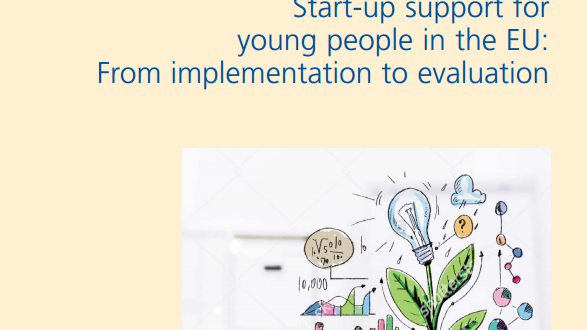
News -
Understanding what works is key for effective youth entrepreneurship policies
(Dublin, Ireland): Many start-up support schemes for young people have limited resources, are isolated from broader youth employment policies, and are not assessed from a long-term perspective. Understanding what elements of start-up support work and how interventions can be improved is essential if youth entrepreneurship policies are to be effective for young people. This is according to Eurofound’s new report Start-up support for young people in the EU: From implementation to evaluation, which looks at the variety of start-up support measures for young people implemented in EU Member States.
Despite a higher proportion of young people expressing a preference for self-employment than older age groups, the self-employment rate for young people in the EU is particularly low. This is due to insufficient resources and barriers such as a lack of capital and training, as well as a fear of failure. The promotion of youth entrepreneurship was emphasised in the European Commission’s 2012 Youth Employment Package, which was adopted at the height of youth unemployment in Europe. One of its aims is to ensure greater availability of start-up support services for young people.
Despite the emphasis on youth entrepreneurship in youth employment policy, many start-up interventions for young people are small-scale, temporary measures with relatively limited financial resources. Few start-up support measures are set within larger policy frameworks or broader youth employment strategies.
Successful youth specific initiatives typically feature ‘soft’ support in the form of entrepreneurship training, mentoring and coaching. For example, there is evidence that interventions offering hands-on experience on how to run a business at a fairly young age in a safe environment can be particularly effective. There is a pressing need to investigate the long-term impact of these interventions on the labour market outcomes of young people. Current interventions are isolated and impact evaluations rarely indicate whether and how the measure should be modified, or whether it should be halted altogether.
If start-up support schemes are evaluated from a long-term perspective and policies become more tailored to the needs of young people, entrepreneurship may become a viable option for some. However, failing to commit to comprehensive evaluations of start-up support schemes can undermine broader youth entrepreneurship policies. Without comprehensive evaluation, schemes will not be tailored to meet the specific needs of young people, and could ultimately prove to be ineffective.
Download the report Start-up support for young people in the EU: From implementation to evaluation: http://bit.ly/StartupYouth
For further information, contact:
- Måns Mårtensson, Media Manager, on email: mma@eurofound.europa.eu, telephone: +353-1-204 3124, or mobile: +353-876-593 507
- James Higgins, Promotions Officer, on email: jhi@eurofound.europa.eu, and telephone: +353-1-204 3157
- Sara Riso, Research Officer, on email: sri@eurofound.europa.eu and telephone: +353-1-204 3216

